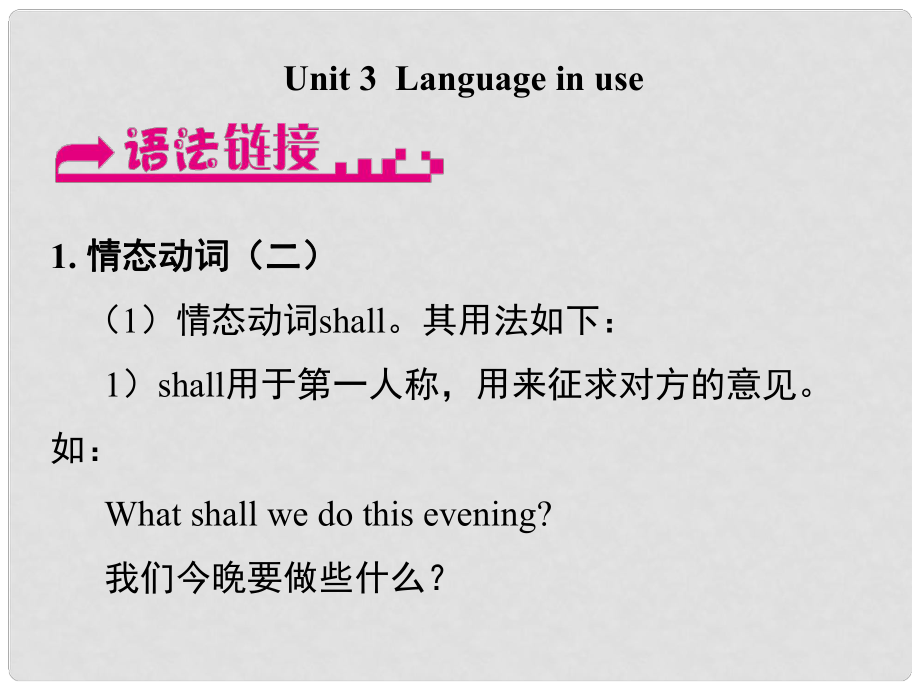《浙江省嘉興市秀洲區(qū)九年級(jí)英語(yǔ)下冊(cè) Module 5 Unit 3 Language in use課件 (新版)外研版》由會(huì)員分享�����,可在線閱讀���,更多相關(guān)《浙江省嘉興市秀洲區(qū)九年級(jí)英語(yǔ)下冊(cè) Module 5 Unit 3 Language in use課件 (新版)外研版(24頁(yè)珍藏版)》請(qǐng)?jiān)谘b配圖網(wǎng)上搜索�。
1����、Unit 3 Language in use1. 情態(tài)動(dòng)詞(二)情態(tài)動(dòng)詞(二) (1)情態(tài)動(dòng)詞shall。其用法如下: 1)shall用于第一人稱���,用來(lái)征求對(duì)方的意見(jiàn)�。如: What shall we do this evening? 我們今晚要做些什么�? 2)shall 用于第二、三人稱���,表示說(shuō)話人給對(duì)方的命令�、警告、允諾或威脅��。如: You shall fail if you dont work hard. 如果你不努力學(xué)習(xí)����,你就會(huì)考不及格�。(表示警告) He shall have the book when I finish reading it. 當(dāng)我讀完,他就能拿到這本書(shū)���。(表示允諾
2�、) He shall be punished. 他應(yīng)該受到懲罰�����。(表示威脅) (2)情態(tài)動(dòng)詞will, would�。其用法如下: 1)表示請(qǐng)求、建議等���,would更委婉�。如: Will/Would you pass me the ball, please? 你能把那個(gè)球傳給我嗎�����? 2)表示意志��、愿望或決心。如: I will never do that again. 我再也不那樣做了�����。 They asked him if he would go abroad. 他們問(wèn)他是否要出國(guó)��。 3)would表示過(guò)去反復(fù)發(fā)生的動(dòng)作或某種傾向��。would表示過(guò)去習(xí)慣時(shí)比used to正式�����,且沒(méi)有“現(xiàn)已無(wú)此習(xí)
3�、慣”的含義。如: During the vacation, he would visit me every other day. 度假期間��,他隔幾天就會(huì)來(lái)拜訪我����。 The wound would not heal. 這個(gè)傷口無(wú)法愈合。 4)表示估計(jì)或猜想�����。如: It would be about ten oclock when she left home. 她離開(kāi)家的時(shí)候估計(jì)是十點(diǎn)左右。 (3)情態(tài)動(dòng)詞should���。其用法如下: 1)should表示“應(yīng)該”�,相當(dāng)于ought to���。如: I should help her because she is in trouble. 我應(yīng)該幫助她��,因
4、為她遇上麻煩了����。 You ought to take care of the baby. 你應(yīng)該照顧好嬰兒。 2)表示勸告����、建議或命令。如: You should go to class right away. 你應(yīng)該立即去上課��。 Should I open the window? 我該開(kāi)窗嗎��? 2. 不定代詞不定代詞other, the other, another, others與與the others的區(qū)別的區(qū)別 (1)other可以作形容詞���,后面跟單數(shù)或復(fù)數(shù)名詞���,意為“其他的��;別的”���。如: Where are his other books? 他的其他書(shū)在哪里? I havent ha
5����、d any other books except this one. 除了這本書(shū)我沒(méi)有其他的書(shū)了。 (2)other也可以用作代詞�,與冠詞the連用構(gòu)成the other,表示兩個(gè)人或物中的“另一個(gè)”�。常與one搭配構(gòu)成one., the other.句型,意為“一個(gè)��,另一個(gè)”���。如: He has two brothers. One is 10 years old, the other is 5 years old. 他有兩個(gè)兄弟�。一個(gè)10歲���,另一個(gè)5歲�。 She held a ruler in one hand and an exercise book in the other. 她一只手拿
6����、著尺子�,另一只手拿著練習(xí)本����。 (3)other作代詞時(shí),可以有復(fù)數(shù)形式others�,泛指另外的人或物。常與some搭配構(gòu)成some.,others.句型�,意為“一些,另一些”����。如: Some went to the cinema, others went swimming. 一些人去了電影院��,另一些人去游泳了�����。 This coat is too large. Show me some others, please. 這件外套太大了���。請(qǐng)給我看看其他的���。 (4)the others表示特指某范圍內(nèi)的“其他的人或物”。如: We got home by 4 oclock, but the other
7、s didnt get back until 8 oclock. 我們四點(diǎn)鐘之前就到家了�����,但是其他人直到八點(diǎn)鐘才回去���。 In our class, only Tom is English, the others are Chinese. 在我們班�����,只有湯姆是英國(guó)人�,其他人都是中國(guó)人�。 (5)another可以作形容詞,修飾后面的名詞��,意為“另一�����;又一”�,還可以跟代詞one。如: You can see another ship in the sea, cant you? 你能看到海上的另一艘輪船�,不是嗎? Mary doesnt want to buy this shirt. Would yo
8�����、u please show her another one? 瑪麗不想要買(mǎi)這件襯衫。你能給她看另外一件嗎�? another也可以作代詞用,意為“另一個(gè)”���。如: Im still hungry after Ive had this cake. Please give me another. 我吃了這塊蛋糕后還是很餓����。請(qǐng)給我另一塊�。【話題呈現(xiàn)話題呈現(xiàn)】 本模塊圍繞“Look after yourself”展開(kāi)話題�,要求學(xué)生寫(xiě)一篇以“My Rules for a Healthy Life”為題的文章,在文章中��,給出恰當(dāng)?shù)慕ㄗh與例子��?����!炯丫渌C萃佳句薈萃】 It is very important to
9�、 keep healthy. 保持健康很重要��。 We should go to bed and get up early. 我們應(yīng)該早睡早起。 We should eat healthy food. 我們應(yīng)該吃健康的食物����。 We should do more exercise. 我們應(yīng)該做更多的鍛煉。 Last Tuesday, I got a cold and had a pain in my head. 上周二我感冒了�����,頭有點(diǎn)疼�����。 I didnt feel like eating anything. 我不想吃任何東西�����。 I decided to see the doctor. 我決定去看醫(yī)
10�����、生��。 In the doctors office, the doctor looks over me carefully. 在醫(yī)生辦公室��,醫(yī)生對(duì)我進(jìn)行了仔細(xì)的檢查���。 He said, “Nothing serious.” And he told me to take a rest and drink more water. 他說(shuō):“沒(méi)什么嚴(yán)重的���?��!比缓笞屛液煤眯菹ⅲ嗪人?��。 The doctor asked me to take the medicine three times a day. 醫(yī)生叫我一天吃三次藥�����。 A few days later, I felt better. From t
11���、hen on, I believe that keeping healthy is the most important thing in the world. 幾天后,我感覺(jué)好多了���。從那以后�����,我相信保持健康是世界上最重要的事情?��!緦?xiě)作任務(wù)寫(xiě)作任務(wù)】 請(qǐng)用英語(yǔ)簡(jiǎn)要介紹一下如何才能保持健康����,并展開(kāi)合理的想象。 要求:1. 80詞左右�;2. 文中不得出現(xiàn)真實(shí)的人名和校名等相關(guān)信息。 【寫(xiě)作指導(dǎo)】 1. 這是一篇說(shuō)明文��,要求說(shuō)明人們是如何保持健康的�����。文章可以從充足的睡眠�����、合理的飲食�����、適度的運(yùn)動(dòng)��、良好心情的保持等方面展開(kāi)寫(xiě)作��。為了言之有理�,可以添加相應(yīng)的事例�����。 2. 說(shuō)明文多用于一般現(xiàn)在時(shí)態(tài)����;人稱以第
12���、一人稱為主�。Beginning開(kāi)篇點(diǎn)題開(kāi)篇點(diǎn)題 All of us want to be 1 .healthyBody保持健康的建議保持健康的建議 2. First, sleep is , we need sleep.3. A healthy diet is also , and and fish are good for us.4. We need to to keep fit, such as .Ending其他建議其他建議 A good state of mind is 5 .important eight hours important vegetables fruitdo some
13�、exercisejoggingimportant【自主創(chuàng)作自主創(chuàng)作】 【范文展示范文展示】 All of us want to be healthy. First, I think sleep is important. Usually we need about eight hours sleep every night. Then we will feel active and energetic during the day. A healthy diet is also important. Fresh vegetables and fruit and fish are good fo
14、r us. We shouldnt eat snacks and fast food too much, such as hamburgers and Coke. Everyone needs to do some exercise in order to keep fit, such as jogging and playing ball games. Of course there are other ways to keep healthy. I think having a good state of mind is very important.【升格點(diǎn)撥】 1. 短文有幾個(gè)承上啟下的連詞��,將主要句型連成文章的提綱���。 2. 短文語(yǔ)氣簡(jiǎn)潔�、通順����,表達(dá)正確,切中要點(diǎn)��。
 浙江省嘉興市秀洲區(qū)九年級(jí)英語(yǔ)下冊(cè) Module 5 Unit 3 Language in use課件 (新版)外研版
浙江省嘉興市秀洲區(qū)九年級(jí)英語(yǔ)下冊(cè) Module 5 Unit 3 Language in use課件 (新版)外研版

